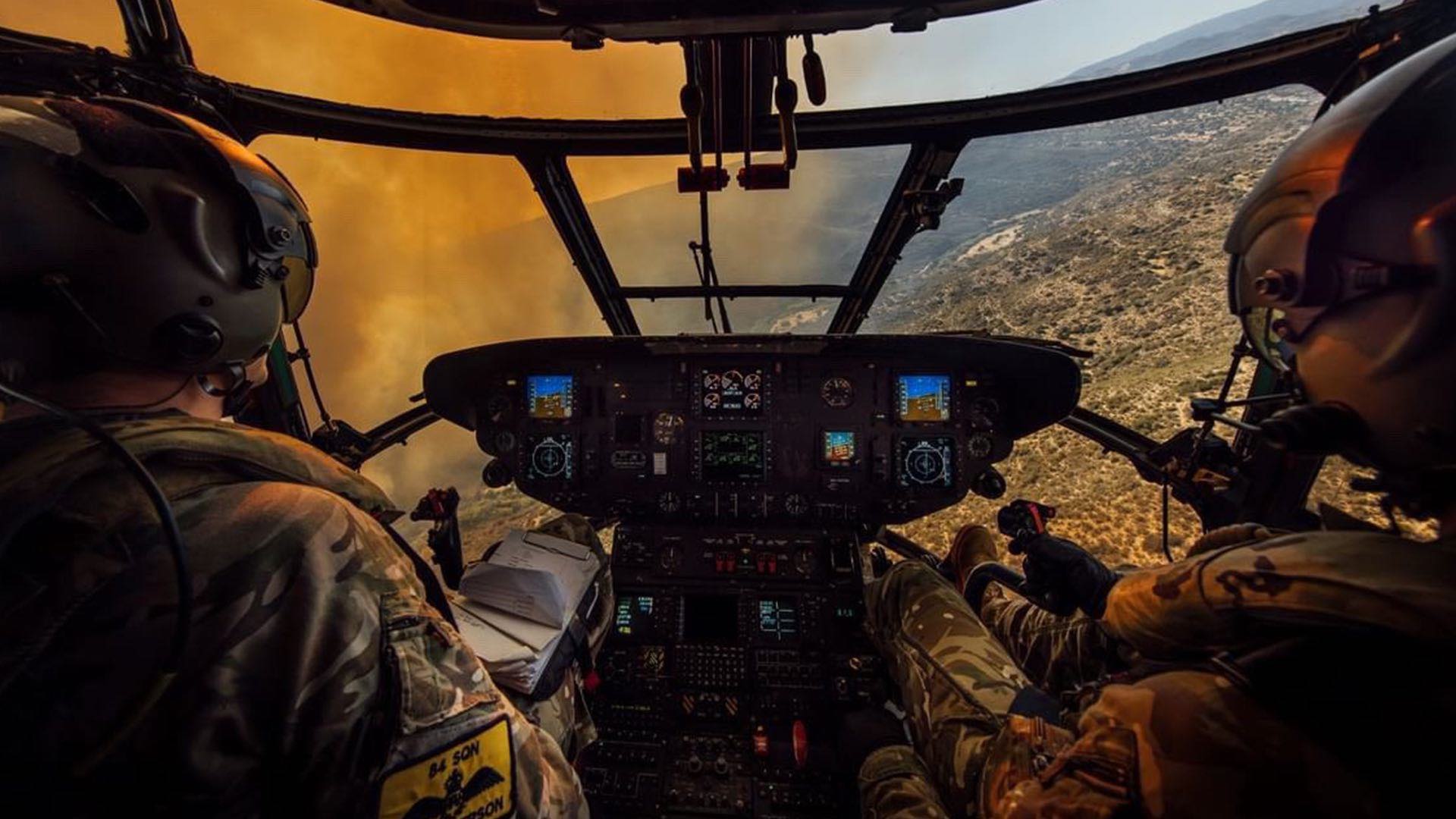


The intervention underlines Britain’s enduring strategic presence on the island and its close cooperation with Cypriot authorities in the face of unprecedented natural disaster.
The Ministry of Defence confirmed today that British Forces Cyprus acted alongside local firefighting teams to protect communities as a sprawling blaze consumed over 120 square kilometres of forested hillside in southern Cyprus.

The fire erupted near Limassol and threatened 15 villages before it could be contained. Over a grueling 48-hour period, RAF Chinook helicopters based at RAF Akrotiri conducted aerial water-drops, while ground crews supported with earth-moving equipment and medical aid.
British personnel worked in tandem with Cypriot emergency services to bring the flames under control in less than two days, though tragically two lives were lost during the ordeal.
It was a test of preparedness, and the UK response was swift. The forces stationed at the sovereign base areas, including the Akrotiri and Dhekelia installations, were ready.
Their assets were instantly deployed to tackle both civilian and Defence structures threatened by the inferno.
The sight of Chinooks—aircraft more commonly associated with battlefields than fire lines—dumping thousands of gallons of water over burning ridge lines was striking. The aircraft’s long-range reach and load capacity made them indispensable in inaccessible mountainous terrain, where roads were narrow and fire engines often found themselves hampered by smoke and wind.
Meanwhile, bulldozers cleared firebreaks, and military medics treated smoke inhalation and other injuries before handing patients to local hospitals. Logistics teams distributed water and supplies to front-line civilian crews, helping sustain prolonged operations in sweltering heat.
The situation was described by Cypriot officials as “unprecedented”. A government spokesperson acknowledged that firefighting forces had responded at full strength, deploying aviation, ground crews, and medical teams from the outset. Residents described scenes of widespread panic as flames converged on hillside villages. Vehicles were abandoned and homes evacuated in haste. Tragedy struck when two people were found dead in a burned-out car as they sought to flee the inferno.
Local firefighter stations were stretched hard. External aid from Spain, Jordan, Israel, Egypt, Lebanon and Greece followed rapidly, but it was the timely UK contribution that helped turn the tide.
This assistance is part of a well-established emergency cooperation framework. British Forces Cyprus, numbering roughly 3,500 personnel and overseeing both the Akrotiri and Dhekelia Sovereign Base Areas, are constitutionally permitted to support local authorities during crises. These bases are not relics of empire, but critical strategic assets—including an airfield at Dhekelia—that regularly assist during regional emergencies.
Many observers note that British forces frequently conduct joint disaster response exercises with their Cypriot counterparts precisely because of Cyprus’s vulnerability to wildfires—a susceptibility exacerbated by heatwaves and prolonged drought.
While the focus is on Cyprus, the wider Mediterranean is facing a full-scale climate emergency. Intense heat in Turkey, Greece, and parts of Italy has ignited record-breaking fire storms. In Turkey alone, ten firefighters perished battling blazes near Eskisehir amid temperatures soaring past 44 °C. Cyprus’ emergency, though tragic, is a stark indicator of climate volatility spreading across the region, and a reminder that national borders provide scant protection against nature’s wrath.
Figures show that over 250 fire crews, backed by more than 75 vehicles and 14 aircraft, were involved in suppressing the Cyprus blaze. The UK effort represented the only sizeable military contribution, offering critical aerial support when conditions overwhelmed local capacity.
The rapid British deployment is notable not only for its military efficiency but for its diplomatic resonance. In recent years, Britain’s ties with Cyprus have remained warm, anchored in both strategic cooperation and commercial relations. This assistance reaffirms a partnership that extends beyond politics into civil solidarity in moments of peril.
The British High Commission issued a statement expressing sadness over the loss of life and assuring both ongoing support and close coordination with Nicosia. Though the bilateral relationship is not without its occasional friction, the fire response cast Britain in a supportive, neighbourly light, not as a former colonial presence.
Wider EU participation, as seen in the EU’s activation of volunteer firefighting aircraft, suggests broadly shared European responsibility. But it has been the British military’s unique readiness and proximity, rather than Brussels bureaucracy, that made a concrete difference in the early hours of the disaster.
With the fires now largely under control, attention turns to rebuilding. Villages scorched, vineyards charred, and livelihoods disrupted all demand recovery plans. Cyprus’s president has announced compensation schemes and support for affected residents, but residents warn that legal and compensation frameworks remain slow to mobilise.
Critics argue that Europe must treat these disasters not as episodic emergencies, but as warning signs. British involvement may be efficient, but it should not mask the need for greater resilience and preventative infrastructure, particularly in fire-prone Mediterranean communities.
The operation in Cyprus may seem a footnote to the grander story of geopolitics, yet it encapsulates the enduring utility of Britain’s overseas bases and the capacity of disciplined armed forces to respond to environmental crises in a fragile world. It is a quietly powerful display of deterrence not through arms, but through readiness, humanitarian solidarity, and the ability to move swiftly when needed.
The tragedy of two lost lives hangs over the operation. But the swift containment of the blaze, protecting human settlements and military infrastructure alike, offers a rare success in a region increasingly defined by climate emergency.
When disaster strikes, sharing water—not weapons—is sometimes the most potent demonstration of national strength.
Main Image: (MOD)